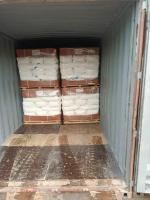Our Products
Flocculant / Cationic flocculant of Zetag 8147 8160 can be replaced by Chinafloc C4008 and Chinafloc C6008


Cationic flocculant of Zetag 8147 8160 can be replaced by Chinafloc C4008 and Chinafloc C6008
Zetag 8147 and Zetag8160 are two cationic flocculant with 40% and 60% chagre and high molecular weight ,can be used for water treatment and sludge dewatering .Chinafloc C4008 and Chinafloc C6008 can replace of them totally with good result.
The main application of cationic flocculants lies in their use as chemical agents for water and wastewater treatment processes. Cationic flocculants
are part of a broader category of flocculants, which are chemicals designed to promote the aggregation of suspended particles in liquids, forming
larger clumps called flocs. These flocs are easier to separate from the liquid, allowing for more efficient solid-liquid separation processes. In this context, cationic flocculants have gained significant importance due to their unique characteristics and specific
uses in various industrial and municipal applications.
The purpose of cationic flocculants is to neutralize the negative charge present on suspended particles in water, thereby destabilizing the colloidal
system and promoting particle agglomeration. The cationic flocculants contain positively charged functional groups that interact with the negatively
charged particles, causing them to come together and form larger aggregates. This process is known as flocculation.
One of the primary applications of cationic flocculants is in the treatment of drinking water and wastewater. In municipal wastewater treatment plants
, cationic flocculants are used to enhance the settling of suspended solids and the removal of organic matter, such as bacteria and other pathogens.
By facilitating the aggregation of solids, cationic flocculants aid in the formation of a sludge that can be more easily separated from the water.
Additionally, in industrial settings, cationic flocculants find application in various processes, including mining, paper manufacturing, and chemical
production. In mining operations, these flocculants are used to separate fine particles from water in tailings ponds, reducing the environmental
impact of mining activities. In the paper industry, cationic flocculants are employed to improve the drainage of water from pulp during papermaking,
leading to increased efficiency and reduced water consumption.
Moreover, cationic flocculants play a crucial role in the treatment of industrial wastewater, where their ability to promote particle aggregation is
employed to remove pollutants and contaminants from effluent streams. This aids in meeting environmental regulations and ensuring compliance
with discharge standards.
Another essential application of cationic flocculants is in the field of sludge dewatering. Sludge, a byproduct of wastewater treatment, is typically a
semisolid material with a high water content. Cationic flocculants are used in sludge dewatering processes to enhance the formation of flocs,
allowing for improved water separation and more efficient dewatering.
Additionally, cationic flocculants are employed in the treatment of stormwater runoff. In urban areas, stormwater runoff can carry various pollutants
and contaminants, which can have adverse effects on receiving water bodies. Cationic flocculants assist in the removal of these pollutants by
promoting the aggregation of particles and their subsequent removal through sedimentation or filtration processes.
Furthermore, cationic flocculants have applications in the oil and gas industry, where they aid in the separation of solids from drilling fluids and
produced water. By facilitating the removal of suspended solids, these flocculants contribute to the efficient operation of oil and gas extraction
processes and reduce the environmental impact of drilling activities.
The use of cationic flocculants is not limited to water and wastewater treatment alone. They also find applications in other fields, such as in the
treatment of effluents from the food and beverage industry, the removal of heavy metals from contaminated soils, and in soil erosion control
measures.
In conclusion, cationic flocculants play a vital role in numerous water and wastewater treatment processes, enabling efficient solid-liquid separation and the removal of contaminants. Their widespread applications in municipal and industrial settings demonstrate their significance
in safeguarding water resources and promoting environmental sustainability. As technologies and research continue to advance, cationic flocculants
are likely to evolve further, leading to more effective and sustainable solutions for water treatment challenges in the future.


